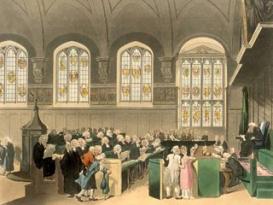John Carson's research project investigated how the Anglo-American legal and medical communities constituted and contested the concept of “unsoundness of mind” (non compos mentis) during the eighteenth and nineteenth centuries. During the first decades of the nineteenth century, an extraordinary transformation took place in Anglo-American adjudications around the issue of mental competency. Challenging strict common law standards minimizing occasions where an actor’s ability to make a will, enter into a contract, get married, or the like could be placed in question, physicians and jurists sought, often successfully, to introduce more capacious understandings of impairments that might render an individual unable to manage his or her affairs.
For all the similarity in goals, however, the relations between doctors and lawyers—and more broadly between medicine and the law—were anything but easy, as each profession jealously guarded its own prerogatives and proved suspicious of expertise drawn from other quarters. At the same time, the practical necessities involved in remaking notions of, and practices around, mental deficit, diminished responsibility, weakness of mind, and a host of other conditions loosely categorized in the law as “unsoundness of mind,” often encouraged each community to cooperate as well as spar with the other.
John Carson's goal in this project was to use the newly emerging quasi-sub discipline of medical jurisprudence to examine this tangle of contradictory tendencies and motives by analyzing the very different languages of mental impairment and personal agency that evolved within the legal and medical worlds during the late eighteenth and nineteenth centuries. Central to my investigation is concern with the ways and degree to which quantification served as a means to establish demarcations between the normal and those deemed “unsound of mind.”

